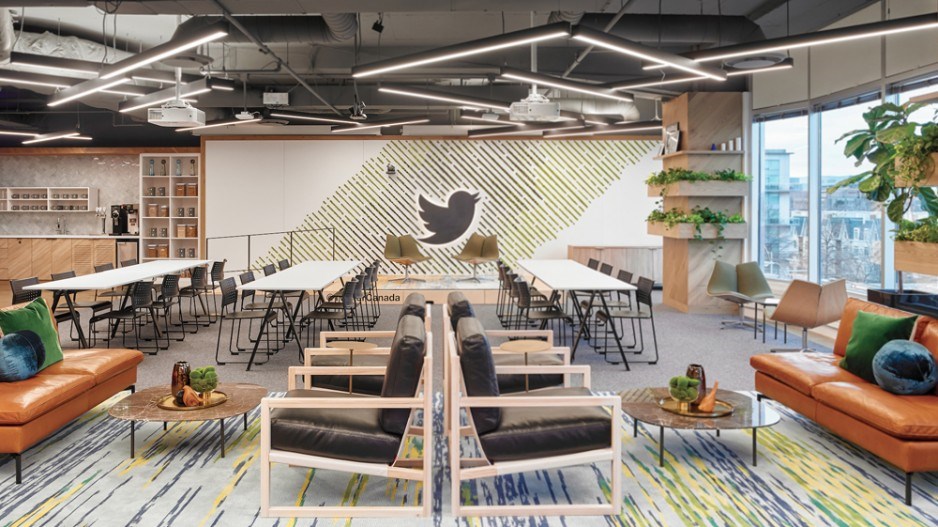Twitter Inc. (NYSE:TWTR) co-founder Jack Dorsey caught observers off guard this week with his sudden departure as CEO of the social media giant.
For now, the San Francisco-based tech company tallying more than 200 million daily active users isn’t banking on any such attrition from its emerging Vancouver engineering team.
Twitter revealed plans in March to ramp up Canadian hiring after initially launching a Toronto office in 2013. Since the start of the year, the Vancouver team has tripled to 30 employees from about 10.
While the West Coast hiring spree doesn’t quite match the scale of efforts by other U.S. tech giants like Microsoft Corp. (Nasdaq:MSFT) and Amazon.com Inc. (Nasdaq:AMZN), Twitter’s move reflects increasing demand for local tech labour stemming from multinationals.
“We are a much smaller company when compared to Amazon, but our … [reputation] is fairly widely known,” said staff software engineer Hanson Ho, who serves as tech lead for the Vancouver team.
“The ability for us to come in here and make some real meaningful impact is much higher. We are less of a cog in a big wheel than some of the other companies where their engineering staff would be 20,000.”
Vancouver has drawn 12,900 new workers into the local technology sector over the past two years, according to an October CBRE Group Inc. report.
That’s the third-fastest rate of growth (20.9%) among 30 cities measured by the real estate services firm in 2019 and 2020. Vancouver trails only No. 1 Toronto (increase of 40,200 jobs) and No. 2 Seattle (38,559 jobs), which registered 26.4% and 21.9% growth respectively during that same period.
And hiring appears to be ramping up in 2021 as the mass vaccination campaign takes hold and the economy further reopens.
Microsoft revealed in March it was adding 500 workers to its Vancouver roster this year, bringing the local head count to 1,700 people.
Amazon’s hiring efforts appear even more ambitious. The tech giant announced plans last fall to add 3,000 workers to its Amazon Web Services facilities in Vancouver as it committed to leasing an additional 680,000 square feet of the old Canada Post building on West Georgia Street. It followed up this past June with plans to hire 1,800 workers to be split between Vancouver and Toronto.
Amazon currently has 3,500 tech workers on its roster in Vancouver.
Meanwhile, tech firm Dialectica Ltd. of London, England, said in November it would hire 100 workers in Vancouver over the next three years, and Miami-based Kaseya Ltd. committed in September to hiring 75 workers by the end of next year.
Leading up to March 2020, tech companies such as Tipalti Inc., Grammarly Inc. and Brex Inc. announced expansion plans within a few months of each other. That pace soon dropped off during the COVID-19 crisis, and Ottawa-based Shopify Inc. (TSX:SHOP) cancelled plans for a 1,000-worker, 70,000-square-foot office at Four Bentall Centre on Dunsmuir Street.
But Tristan Jung, a senior engineering manager who leads Twitter’s Toronto team, said the recent hiring push comes as the company seeks to further “decentralize” itself from its headquarters.
“As we looked at how we wanted to expand our expertise and our engineering group, we saw that there were a lot of different opportunities within Canada across the country in terms of where to hire this talent,” he said. “Vancouver also has a strong kind of presence in terms of the schools and the folks who are within that field. So we thought we would be able to kind of tap into these candidates and make sure that we’re able to attract them and retain them within Twitter.”
Labour costs, meanwhile, remain relatively low compared with Vancouver’s new National Hockey League rival down the I-5, according to CBRE. The average annual wage paid to a local software engineer stands at US$97,718 compared with US$134,430 in Seattle.
Twitter’s offices in Toronto are home to most of the company’s 200-person head count in Canada.
Jung said there are no immediate plans to open an office in Vancouver.
Instead, those who fall under the team’s Vancouver umbrella work remotely and meet in person occasionally while collaborating with colleagues as far away as Singapore on features such as push notifications or fine-tuning the platform for cracking down on spam and abuse.
Colliers International Canada executive vice-president Colin Scarlett, citing data from his real estate firm, said the tech sector is currently driving 62% of demand for downtown Vancouver real estate.
“People finally have just decided, ‘You know what? We just can’t operate our business like this. We have to start thinking for the long term.’ And some of this demand is pent-up demand but a lot of it is new,” he told BIV in September. •




